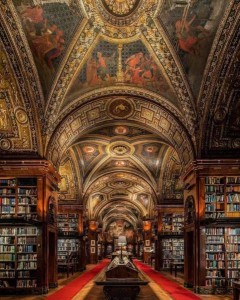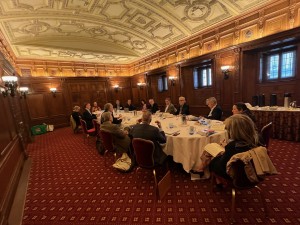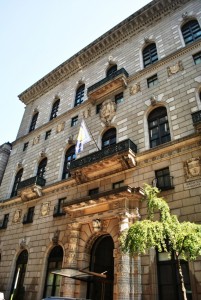Shakespeare’s Rome
Professor David Quint, Yale University
Professor Anthony Grafton, Princeton University
Professor Lawrence Manley, Yale University
EverScholar in New York
January 23-26, 2025
The University Club, New York City
Course fee: $2395
Course has completed.
Embark on an intensive exploration of a remarkable collection of Shakespeare’s masterful works, set against the backdrop of his classical sources, and contemporary world. Probe his lasting influence on how we perceive and interpret Rome in various realms, from the schoolroom to popular culture and the arts.
EverScholar presents this highly anticipated program, designed and now led by a magnificent group of the finest Shakespeare scholars: Professors Tony Grafton, David Quint, and Larry Manley.
At the heart of this program are three of Shakespeare’s tragic masterpieces inspired by Plutarch’s Lives of the Noble Greeks and Romans:
- Julius Caesar – A gripping depiction of the conspiracy against Caesar, its tragic fallout for the conspirators, and its catastrophic impact on the Roman Republic.
- Antony and Cleopatra – A dramatic retelling of the civil wars post-Caesar’s death, focusing on Marc Antony’s fateful alliance with Cleopatra, the ensuing victory of Augustus Caesar, and the dawn of the Roman Empire.
- Coriolanus – An exploration of the threats faced by the nascent Roman Republic in 491 BC, highlighting the banishment, return, and tragic end of the formidable aristocratic hero, Caius Martius Coriolanus, which set the stage for Rome’s tumultuous political future.
To frame our understanding of these masterpieces, we will begin with two of Shakespeare’s earlier works:
- The Rape of Lucrece – An early narrative poem influenced by Livy’s History of Rome from the Foundations, which examines the tyrannical act of sexual violence that catalyzed the fall of the Tarquinian kings and the birth of the Republic.
- Titus Andronicus – A collaboration likely involving other playwrights, this revenge tragedy draws from Seneca and Ovid to investigate the tensions between Roman civilization and barbarism, and is connected to Shakespeare’s later works through its exploration of Roman virtue and womanhood.
The course will culminate with a discussion of Cymbeline, a historical romance set during the Roman invasion of Britain, to assess Shakespeare’s critique of Roman civilization in the context of his own era.
Our examination of Shakespeare’s Rome will be enriched by considering the historical and cultural backdrop of the Renaissance, including:
- The humanistic revival of the ancient world through archaeology, literature, and the arts.
- Influential depictions of Rome by figures such as Dante, Machiavelli, Michelangelo, and Montaigne.
- Innovations in historical and biographical writing in vernacular languages.
- Contemporary philosophical and political debates, including neo-Stoicism, tyrannicide, empire, and republicanism.
Readings will encompass Shakespeare’s six principal Roman works, selections from his classical sources (such as Livy, Plutarch, Appian, Seneca, Ovid, Virgil, and St. Augustine), and recent critical essays that crystallize key issues. Our collective encounter with Shakespeare’s distinctive and unforgettable versions of Rome will be at the core of this intellectual journey.
Join us for a profound exploration of a great yet flawed civilization through the lens of one of history’s greatest playwrights, taught by today’s greatest Shakespeare scholars, with EverScholar, where we deliver extraordinary immersive intellectual programs for lifelong, always curious, always growing, learners.
Our Lead Faculty:
Our Guest Faculty:
Readings
All EverScholar courses actually start months before our meeting. After registration, you will receive all books and scholarly articles for the course, and will immerse yourself in great works curated by our faculty. “Shakespeare’s Rome” is no exception, with works ranging from contemporaneous writings to great books written by your own EverScholar professors. Primary sources will mix with authoritative texts to produce night after night of joy as you prepare for your return to the life of the mind.
Special Events
One of EverScholar’s unique and most beloved features are our Special Events; sessions at a number of well-known (such as a museum or Art Gallery) or less-known centers of collection and learning. “Shakespeare’s Rome” continues this tradition.
Details on Special Events for this course will be posted soon; well in advance of the course.
Beyond the Classroom
Everything that happens during an EverScholar program is enhanced by the fact that it takes place in a learning-promoting environment.
This program takes place at the University Club of New York City, 1 West 54th Street, in the cultural center of Manhattan. Discounted housing is available at the University Club.
Learn more about the experience!



The course begins with a reception and dinner on Thursday…. and ends late Sunday afternoon. The program cost is $2,395 per person. Deposit is $500 per person. Balance is due on September 1, 2024. Refund and full COVID-19 refund policies are detailed on registration page (click on “Register Now” button above for this information along with accommodation details) – you can register without worries. Looking forward to seeing you there!

